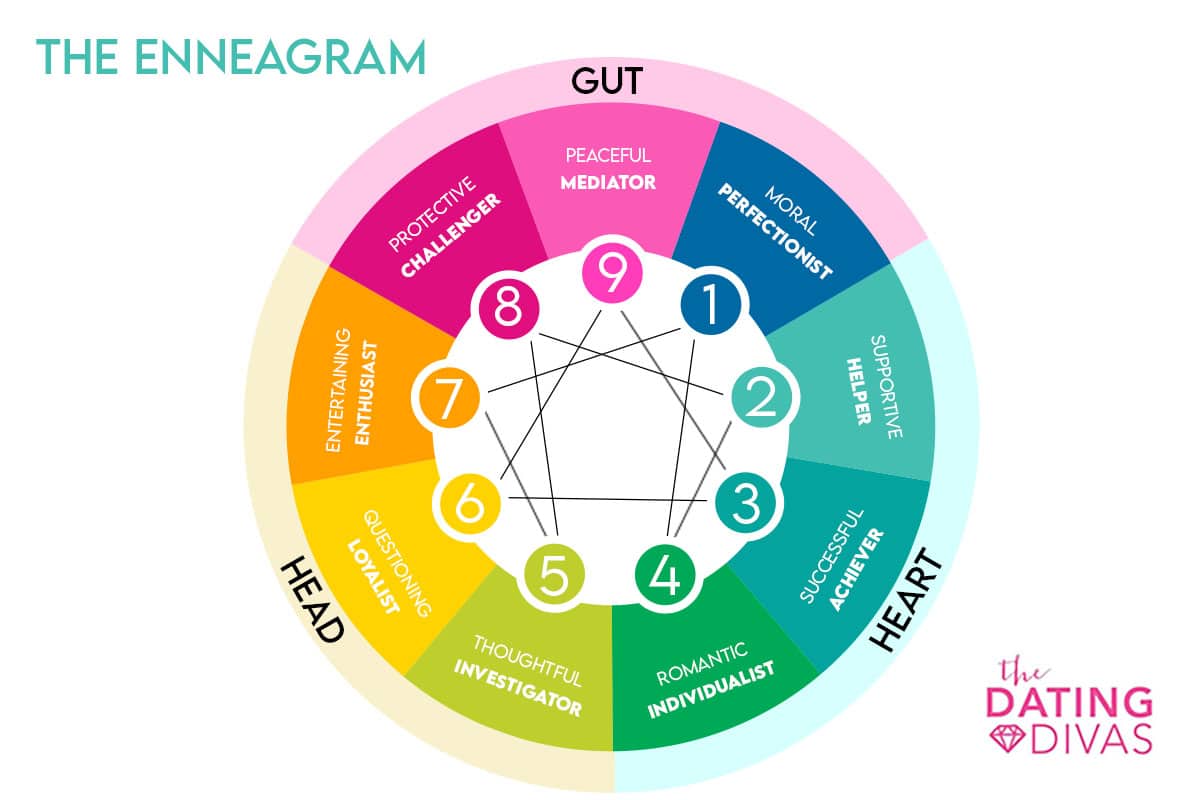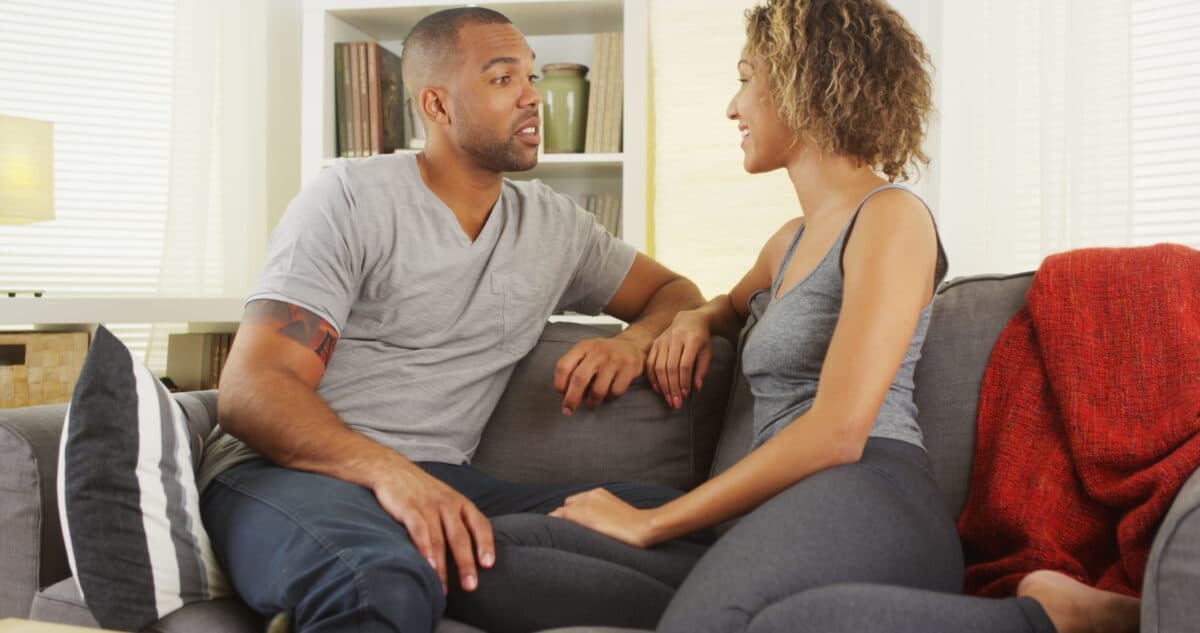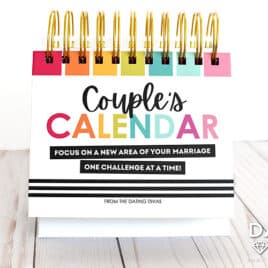Have You Heard About the Enneagram?
Have you seen all the hype about the Enneagram online?! If you’re on social media, you already know there are both pros AND cons to living in an age where information is so quickly and easily accessible. One of the many benefits to this rise of virtual conversation is the beautiful outpouring of counselors and therapists sharing SO MUCH helpful insider content on their platforms. {Anybody else have an algorithm that fills their Instagram feed with expert relationship tips… or is that just me?!🤣}

As someone who’s been mildly {okay, fine… obsessively} intrigued by this curious circular personality typing system for most of my marriage, I am SO excited to share with you exactly how this tool works and how transformative it can be, especially for couples in a committed relationship!
Table of Contents
- Have You Heard About the Enneagram?
- The Basics of the Enneagram
- Why the Enneagram is a Tool You Should Use
- Enneagram Type 1: Moral Perfectionist
- Enneagram Type 2: Supportive Helper
- Enneagram Type 3: Successful Achiever
- Enneagram Type 4: Romantic Individualist
- Enneagram Type 5: Thoughtful Investigator
- Enneagram Type 6: Questioning Loyalist
- Enneagram Type 7: Entertaining Enthusiast
- Enneagram Type 8: Protective Challenger
- Enneagram Type 9: Peaceful Mediator
- How the Enneagram Can Transform Your Marriage
- The Best Free Enneagram Test
- Conclusion & Resources
The Basics of the Enneagram
The Enneagram is a century old personality typing system understood by many experts to be a model of the human psyche.
Before we get too far, you may be wondering what on earth a personality typing system even is. Truity.com, one of our favorite sites to visit, has defined this for us!
“Personality typing is a system of categorizing people according to their tendencies to think and act in particular ways. Personality typing attempts to find the broadest, most important ways in which people are different, and make sense of these differences by sorting people into meaningful groups.“
Now, for those who attended any type of pre-marital course or relationship counseling, you were likely guided through a popular marriage tool like The Five Love Languages, an inventory system like the FOCCUS questionnaire, or even another personality typing test like Myers-Briggs.
While these systems have certainly earned their place in the offices of esteemed counselors, therapists, and psychologists, there are also many professionals who feel the Enneagram might be one of the best growth tools available!
What Is So Different About the Enneagram?
“The Enneagram offers you an opportunity to intimately understand the way you impact others dynamically in a relationship as well as bring wellness and balance to your own life.” – Christa Hardin, CEO & Founder of E + M
I had the honor of interviewing a leading voice on this topic, and I think you’re going to love what she had to say as much as I did! Christa Hardin is a coach, podcast host, author, and the CEO of Enneagram + Marriage! Though Christa is one of the FUNNEST people you’ll meet {she IS an Enneagram 7, after all!}, she also has an impressive amount of experience and education under her belt when it comes to growth-work in marriage. With over two decades of working with couples face to face in her counseling practice and multiple degrees relating to Psychology, Christa is TOTALLY our Enneagram and marriage expert.
“Unlike a lot of the other {personality} assessments out there, the enneagram encompasses so many LAYERS of growth for people so that when they have time to dig in farther, they are able to.
When I see myself in these various levels of health and not just the basic level, I get to see that I am still in growth and in process. That is the mindset we love and that is the mindset that would be very hard to accomplish from, let’s say, a Myers Briggs perspective or some of the other inventories I’ve studied from my Psychologist days.”
Why the Enneagram is a Tool You Should Use
One of the reasons the Enneagram has such devoted enthusiasts is because unlike many other personality typing systems, it is not a “test-and-done” type of situation. In fact, if you want to dig in and reap the full benefits of this growth tool, your learning experience will look a lot more like a journey than a destination.
The Enneagram is unique because you are able to take your findings at the basic level or you can press in to take a deeper look at yourself. As Christa is quick to speak of often, it’s all about knowing where we “glow” and knowing where our “shadows” are. Those of us who are able to do this deep work to learn our innate strengths and weaknesses individually as a spouse and also together as a couple are the ones gaining the most beneficial transformation from this tool.

The most important defining feature of the Enneagram is that it dives deeper than personality traits. Both the Enneagram test and its results are meant to address not behavior but the ROOT behind it. This means if you desire to find which of the 9 numbers you identify with, you have to answer questions based on what DRIVES your decisions. The Enneagram both requires and teaches us to search for our motivations in acting the way we do.
Below explains in depth each of the 9 points on the Enneagram circle. We each have one number we identify MOST with. My favorite part about this circular system is that it clearly shows the ways we are all connected amidst our differences and identifies the way we interact with others depending on our health or stress levels. Let’s read about each from the great wisdom of our friends at Truity!
Enneagram Type 1:
Moral Perfectionist
“Enneagram Type Ones like to do things correctly and to high standards. They are typically sticklers for rules, and pay close attention to detail. Ones also avoid making mistakes. To others, their actions appear perfectionistic, responsible and exacting.
Ones are typically sticklers for rules and details, and get frustrated when things don’t live up to their very high standards – at work, in relationships or in their day-to-day lives.
Deepest Fear:
Ones fear being “bad people,” morally flawed, or otherwise seen as imperfect. They cope with this fear by being rigidly disciplined and very hard on themselves {and often, those around them, too}.
Core Motivation:
Ones strive to be good and honorable – and to live a life with purpose. They seek the best and most correct way to do things.”
Enneagram Type 2:
Supportive Helper
“Twos are defined by their desire to belong and to be loved by others. They are helpful, nurturing and caring towards others. They are eager to involve themselves in others’ lives. Twos rarely say no when others ask them for help, and want to prove value to others by always being there for them.
Deepest Fear:
Twos fear being alone and unloved, and cope with this fear by taking care of others and making themselves central to other people’s lives.
Core Motivation:
Enneagram Twos want to feel loved and appreciated, which motivates them to express love toward others in their words and actions.”
Enneagram Type 3:
Successful Achiever
“Threes are defined by their desire to be significant and to distinguish themselves through achievements. To others, Threes appear confident, ambitious and goal-oriented. They are unsure of their innate self-worth, and look for validation through their accomplishments.
Threes are typically very image-focused. It is important to them that others see them as successful.
Deepest Fear:
Threes fear failure, being insignificant or unlovable due to lack of worth. To cope with this fear, they look for ways to win in life, reassuring themselves of their value.
Core Motivation:
Type Threes are motivated by a need for attention and admiration. They strive to be successful and significant to avoid feeling worthless.”
Enneagram Type 4:
Romantic Individualist
“Fours are defined by their sense of being special and different from other people. They are often creative, and present a unique, distinctive persona to the people around them.
Fours experience a deep conflict in that they long to connect with others, but they feel that because they are so unusual, very few people are able to truly see them as they are.
Deepest Fear:
Fours fear that they are flawed and are missing out on some basic aspect of happiness that other people have access to. To cope with this fear, they amplify what is different and special about themselves, looking for the niche in which they can truly be appreciated.
Core Motivations:
Fours are motivated by their desire to express their individuality and to be unique. They do this through creative endeavors and by over identifying with the aspects of their personality that they view as lacking or deficient.”
Enneagram Type 5:
Thoughtful Investigator
“Enneagram Fives are defined by their desire to conserve their energy and to avoid being drained by engagement with the outside world. They focus on being knowledgeable and competent so that they can be as self-sufficient as possible.
Fives enjoy deepening their understanding of the world, expanding their intellect, while minimizing their physical and relationship needs.
Deepest Fear:
Fives fear being overwhelmed by their own needs and the needs of others. To cope with this fear, they withdraw from relationships and maintain a minimalist lifestyle. Fives often focus on the intellectual as an escape from the demands of the world.
Core Motivations:
Fives are motivated by a desire to be competent and possess a strong understanding of their environment. This motivation drives them to a nearly constant state of learning and knowledge accumulation.”
Enneagram Type 6:
Questioning Loyalist
“Sixes are defined by their desire for safety and security. They seek to anticipate and avoid risk, and to ally themselves with trustworthy authority figures and institutions.
Sixes are alert and vigilant, always thinking several steps ahead to anticipate and prepare for what could go wrong.
Deepest Fear:
Sixes fear being unprepared and unable to defend themselves from danger. To cope with this fear, they attempt to be prepared for every possible turn of events.
Core Motivation:
This type is motivated by their need for safety and security. They seek support and reassurance from other people, and after a season of suspicion, can be extremely loyal to people and groups that they trust.”
Enneagram Type 7:
Entertaining Enthusiast
“Sevens are defined by their desire to experience everything life has to offer while avoiding pain and boredom. They appear to others to be lively, fun-loving and hedonistic.
Sevens are often very busy people who bounce from one activity to another in their quest to squeeze every possible bit of enjoyment out of life.
Deepest Fear:
Sevens fear getting stuck in a rut and missing out on the good life. They cope with this fear by constantly seeking out exciting, novel, and fun experiences.
Core Motivations:
More than anything, Sevens want to avoid feeling bored, sad or uninspired.”
Enneagram Type 8:
Protective Challenger
“Eights are defined by their desire to be powerful and to avoid any vulnerability. They present a confident, assertive, and decisive image to others. Eights can be argumentative and intimidating; it is important to them to stand up for what they believe in and to protect those who are weaker than themselves.
Deepest Fear:
Eights fear being vulnerable and powerless more than anything, and cope with this fear by always being strong and in control.
Core Motivations:
Eights are motivated by their desire to be independent and in control. They resist appearing or feeling weak and reject any authority that restricts them.”
Enneagram Type 9:
Peaceful Mediator
“Nines are defined by their desire to maintain a sense of inner peace and harmony. They desire to avoid conflict or other emotional disturbances. They are typically agreeable, calm, and easy to be around.
Nines rarely rock the boat, but they can be stubborn. While they typically go with the flow, they dislike being controlled and will respond with passive resistance if pushed too far.
Deepest Fear:
Nines fear being too needy and thus pushing people away. They cope with this fear by submitting to the desires and agendas of the people around them. Aka: They choose to be agreeable in order to be included.
Core Motivations:
Nines are motivated by their need for peace and harmony in their environment. They strongly desire to avoid conflict and deal with unpleasant emotions.”
What These Enneagram Numbers Tell Us
You may have noticed a key component to the Enneagram as you read the description for each number above. Each number on the spectrum is driven by some sort of motivation – often fear of something like: failure, imperfection, unworthiness, and more. This internal motivation guides the way we act {personality}, the way we behave in a relationship {love languages, etc.}, and the way we communicate {due to our core beliefs about ourselves & what information we deem important}. The Enneagram is consistent with research that explains this simple paradigm: who we are is a combination of both nature and nurture.
How the Enneagram Can Transform Your Marriage
Being aware of what we bring to the altar with our marriage is so important for discovering the deep, fulfilling connection we crave with our spouse. And in turn, allowing them to know what we bring to the table {and vice versa!} creates a hopeful empathy for each other! Our perspectives of each other become softened with grace. Our marriages can flourish as we learn to lean into each other’s strengths {glow!} and assist each other where we may be weak {shadows!}.

How Enneagram Compatibility Works in Your Marriage
Because of all we’ve shared, you likely will not be surprised to hear that we believe Enneagram compatibility is available for ANY number combination! You absolutely can learn to support and work WITH any Enneagram type you’re married to. It simply takes work and understanding of both yourself and your partner. {This is required in any healthy marriage relationship anyway! 😉}
The Enneagram Institute puts Enneagram compatibility this way:
“No pairing of types is particularly blessed and no pairing is particularly doomed.”
Here’s a few Enneagram compatibility tips as you start learning!
Enneagram Type 1 in Marriage
If YOU are the Type 1, it is common to struggle with anger or sex. As the Perfectionist Type, you may find yourself taking over tasks for your partner in order to ensure they meet your high standards. Christa points out that this often creates a parent-child dynamic that quickly feeds into an intimacy related pain-point when not kept in check. Example: “You don’t get sex because you weren’t perfect.” Working to proactively combat this damaging mindset will benefit you.
If YOUR SPOUSE is the Type 1, your spouse is often tired and overworked. The internal critic of an enneagram type 1 can be exhausting for them. While it is their responsibility to learn better management of this perfectionism, you have special opportunity as their closest relationship to encourage them that they are good already. Also, keep in mind that respecting their processes and performing your tasks to their standard {when you can} will communicate great love to your spouse.
Enneagram Type 2 in Marriage
If YOU are the Type 2, it is common for you to serve SO BIG in the world that you unintentionally leave your partner desiring more of you. Make effort to learn how to truly rest in your home oasis alongside your spouse {without waiting on them to pressure you to slow down}. If you are a type 2 who serves big IN the home, it will be important for you to allow your spouse to serve you back sometimes in order to combat potential bitterness. You likely need to better identify and communicate your needs to your spouse as they do not have a mental list running 24/7 like you do.
If YOUR SPOUSE is the Type 2, your spouse likely does not feel the internal permission to slow down. You have the unique position to gently encourage your spouse to relax and remind them of their worthiness to take time for themself. Often, by the time a type 2 is asking for help or requesting you to tackle a task, they may already be upset or embittered. You can love your spouse well by being proactive with your help and attempting to think one step ahead of your spouse’s mental list.
Enneagram Type 3 in Marriage
If YOU are the Type 3, it is common to struggle with calming your mind enough to spend intentional down-time with your spouse. Work together to find a form of quality time that works for both of you. Your tendency to work and perform will always be underlying but finding intentional ways to turn your time together into a space of connection will help you thrive in marriage. Find a game to play! Or, if you struggle putting the phone down, scroll TOGETHER to plan a dream vacation, etc.
If YOUR SPOUSE is the Type 3, your spouse likely needs connection more than they admit or realize. While it is their responsibility to learn self-soothing techniques that allow them to ease out of work mode and come down into a more relational space, type 3’s often struggle with understanding suppressed emotions. Encourage your spouse as they ease out of the accomplishment-mode. Your type 3 partner may also need time to process through vulnerable conversations or failure. You can best love your type 3 by showing up BIG for them in their work and in their feelings.
Enneagram Type 4 in Marriage
If YOU are the Type 4, it is common for your emotions to have a larger hand in painting your reality than they should. You may struggle with projecting those emotions on your spouse or viewing your interactions through a lens of low self-esteem which can present pain-points in your marriage. Be mindful of your desire for validation and lean in to your self-soothing strategies. Your emotions are part of you but they do not always equal truth. Lean into your self-awareness and let it direct you to show up outside of yourself as often as you can.
If YOUR SPOUSE is the Type 4, your spouse feels BIG. Be cautious with how often you push an inquiry. Christa points out that type 4s can be a little 5-ish in that they need time to process and release their emotions occasionally. Your spouse may desire to do this WITH you, or they may not. Be a student of your spouse’s insecurities and mindful of their triggers as well as how to speak to them. You can love your spouse well by holding them in their moments of great feelings without jumping to find fixes. Try to remember your spouse does not intend to seek drama.
Enneagram Type 5 in Marriage
If YOU are the Type 5, it is common for you to excessively lean into your alone time. When your spouse grants you time alone or time to process, be mindful to not abuse the opportunity. As a head-type, make an effort to find activities with your spouse that help you get out of the mind. While you will always prefer to research and process information ahead of time, it is healthy for you to do resistance work in yourself. Gently push yourself out of your comfort zone at times! It’s worth it.
If YOUR SPOUSE is the Type 5, your spouse may need about 30 minutes to decompress between day-to-day events. If they have left work or an outing, give your partner a moment alone before you request time together or attempt to have a conversation. Christa mentions that most type 5s she works with also require time to process an “ask”. Example: Asking your spouse to go to an event or complete a task last minute could be a stressor. Attempt to plan your family calendar ahead of time.
Enneagram Type 6 in Marriage
If YOU are the Type 6, it is common for your worries to take more of your time than you realize. Remember that your spouse may not always have this time to lament the way you do or even to analyze the way you do. Your spouse also may not be a type that feels the internal permission to lounge the way you do. As a type 6, you have the uncanny ability to both lounge AND to worry. 😆 Christa emphasizes that body-work {exercise} is crucial for you to get out of your head and release angst. Let lounging be a reward AFTER body-work rather than seeking comfort first.
If YOUR SPOUSE is the Type 6, there is a lot of weight that comes with all of your spouse’s prolonged thinking and worrying. Like 5s and 7s, your spouse is one of the head-types. Do your best to be gracious when you perceive your partner to be in their head. Also, be generous with the time you give them to process alone. While it is their responsibility to work on keeping their thoughts productive and to work through feelings in a healthy way, you can create a safe refuge for your 6 to return to.
Enneagram Type 7 in Marriage
If YOU are the Type 7, it is common for you to struggle with sharing your stresses because you prefer to bring happiness to the world rather than sadness. As a thinking type, you may find yourself waiting for the other shoe to drop. Be mindful of ways you can choose to lean into trusting your partner. Example: “No one is going to show up for me so I have to show up for me.” Work to combat this headspace pitfall by reminding yourself of your spouse’s dedication to ALL that you are. {Even the negative emotions or not-so-fun moments.} Let them sit with you in this stuff too!
If YOUR SPOUSE is the Type 7, your spouse is incredible at the fun-moments in life. Be mindful that the saying “what you see is what you get” is totally false when it comes to your type 7 partner! There is often many layers of emotion that they are not always forthcoming with. Do the best you can to show your type 7 spouse that ALL of them is welcome with you. It is also important to recognize that while they are known as a gluttonous type, they do often work harder than is let on. You can love your spouse well by giving them adequate time to shyly share hard feelings.
Enneagram Type 8 in Marriage
If YOU are the Type 8, it is common for you to feel as though you are left hanging. Remember that not everyone has as much energy as you. It is important for you to be mindful of this because you could be prone to bitterness. Thinking things like: “I work harder than you in this relationship” or “I work harder than you at work“. You may feel like you have more left to give because your energy is high. But there are gifts other than the passion and protection you offer to those around you. Body-work {exercise} is also very crucial for you as a way to seek emotional health.
If YOUR SPOUSE is the Type 8, your spouse is assertive and bold. Instead of us encouraging them to show up “less big”, it may actually be important for you to work at showing up BIGGER as a way to love your spouse. Let your type 8’s energy rub off on you and energize you. You can also love your spouse well by giving them a term of endearment when you can’t show up. Example: “I am tired right now so I don’t have time for sex or for our movie BUT I love you like crazy and ___ is another time I can do it.”
Enneagram Type 9 in Marriage
If YOU are the Type 9, it is common for you to inherently believe that comfort is the ultimate end goal. Christa points out that 3.5 hours a day is the maximum golden zone of comfort or rest for any person. While 10 hours a day of comfort and no conflict sounds nice, it is actually not a healthy balance. Work to lean into conflict and discomfort for the large portion of your day. Then, you can return home to enjoy comfort, laughter, good food, and rest. Much like a type 6, be mindful of the truth that comfort does not equal connection in your marriage.
If YOUR SPOUSE is the Type 9, you know your spouse hates conflict and may struggle to pull their weight with household tasks. You can assist their avoidance of conflict by making hard conversations fun. Talking budget, money, or chores? Plan the time, set out some snacks, and have a comfortable reward for afterwards. Your type 9 partner is so much more likely to show up when you make an effort to create peace. Encourage them when you see them stepping out of their comfort during their resistance work. You can love your spouse well by allowing them {appropriate} time to lounge and affirming your love after hard talks.

Keep in mind that while many of these characteristics and dynamics are COMMON, that does not make them the rule. Once you’ve confidently determined your Enneagram type, you may still find that you differ from the “norm” on some behaviors. And that’s totally okay! Ready to find out more?
The Best Free Enneagram Test
If you’re looking to get started with your enneagram journey, Christa highly recommends using this Free Enneagram Test from Truity! This is one of the only free Enneagram tests out there that still utilizes Pie Chart results. The reason we love this format is because it is probable your test does not perfectly reflect your number the first time you take it. You will want to note your highest ranking numbers and begin researching them one by one to find which relates on the deepest level.
Personally, it took me nearly two years before I finally discovered and admitted that I am an Enneagram 3! For me, the type explanation that stepped on my toes the most was the number I ended up with. 😉
This Enneagram journey requires work, self-reflection, and some brutal honesty as you look in the mirror, but what you will learn along the way will benefit every single relationship you maintain over your lifetime. As Christa so quotably mentioned, comfort does not equal connection. But after helping couples use the Enneagram to better navigate their relationships, she can also attest that the success stories are WELL worth performing this uncomfortable resistance work in yourself.
Conclusion & Resources
Believe it or not, the Enneagram goes even more in depth than what we could fit in this post today. Ready to get your Enneagram “glow” on and dig deeper?
Find Christa online, via podcast platform, or even on the E+M Instagram for a deeper dive with enneagram, marriage, and encouragement for your growth along the way!
Beginner resources:
- Instagram! Brittany on IG as Enneagram Explained is a great follow for newbies.
- Books! The Road Back to You by Suzanne Stabile overviews it all.
- Workbooks! Christa at E+M has some amazing freebies on her website.
dig deep resources:
- Podcasts! Christa runs an insightful podcast featuring guest episodes.
- Reflection! Suzanne Stabile co-authored a 30-day devotional for each number.
- Marriage Work! Christa has a tool specifically for each number in marriage.




I am so impressed with this article!! It makes me SO excited to dive in!!! Love this so much!!
Thanks Mikayla! I feel like I understand so much more about myself!
I have to admit, I have been a little intimidated in understanding all of this Enneagram stuff but this post detailed it in a simple way. Thank you!
Aw Alise, I’m so glad! 🙌🏼 This is one of my favorite topics so if you end up finding out what you are, we should totally chat! ❤️
My hubby and I just did a few Enneagram tests this year and figured ours out (He’s a 1 and I’m a 4) and haha oh boy did it figure us out. It doesn’t change anything, but I try to remember when going into what could be an argument, that he sees things different than me. It’s also helped him understand why I’m so emotional 😉
AW, Ferren!! I love that the Enneagram has helped give you each a new perspective as you go into conflict! I think you and your hubby have a similar dynamic to me and mine except flip flopped! I am a 3 and Chris is a 6 which often looks like me needing to give him space to feel and him working with my struggle to understand my feelings! {3s love to just work the day away so we don’t have to slow down to feel our hard feels} Isn’t this stuff the FUNNEST to dive into?!
Love this! Yes I think having patience for our spouses and trying our best to understand ourselves and each other is such a beautiful thing! Any tools that can help us work towards peace and harmony are a plus for sure!
Okay I officially need to take the enneagram test haha I never have!
Yesssss 👏🏼👏🏼 And then tell me what you find out!
Such a great post!!!
This is SO insightful!
I love personality tests! I haven’t done this one yet . . . Thank you for the idea!
You totally should! And then circle back and let me know what you are! 🥳